New Jersey primary election 2025: These 6 candidates are running for the Democratic nomination for governor
Ras Baraka, Steve Fulop, Josh Gottheimer, Mikie Sherrill, Sean Spiller and Steve Sweeney are vying for the Democratic Party’s nomination.

From left, New Jersey Rep. Josh Gottheimer; Newark Mayor Ras Baraka; Jersey City Mayor Steve Fulop; moderator NJ Spotlight News anchor Briana Vannozzi; moderator WNYC Morning Edition host Michael Hill; New Jersey Rep. Mikie Sherrill; and former state Senate President Steve Sweeney attend the New Jersey Democratic gubernatorial primary debate Monday, May 12, 2025, in Newark, N.J. (Steve Hockstein/NJ Advance Media via AP, Pool)
What questions do you have about the 2025 elections? What major issues do you want candidates to address? Let us know.
New Jersey’s 2025 primary election is June 10. Gov. Phil Murphy’s term limit and the elimination of the county line ballot are opening up space for a competitive primary race for the Democrats. Six Democrats are seeking their party’s nomination for governor, while five Republicans are competing to be the GOP’s choice.
Voters can find more information, from mail ballot logistics and beyond, in WHYY News’ New Jersey primary voter guide.
Here’s a look at the Democratic candidates and their platforms:
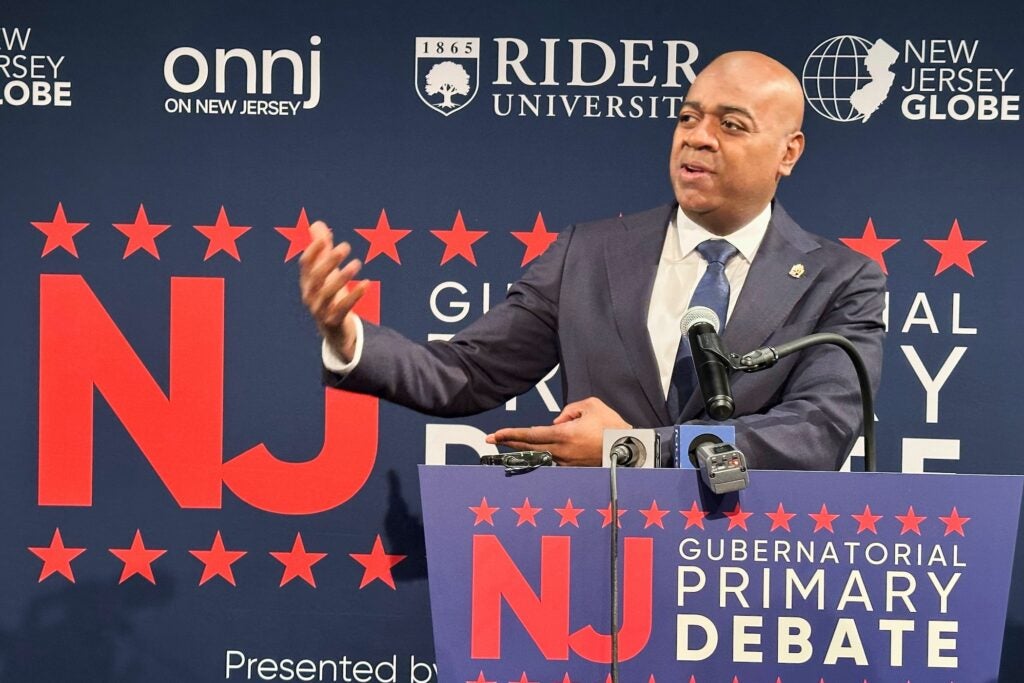
Ras Baraka
Ras Baraka grew up in Newark, New Jersey. He attended Howard University and got a master’s degree from Saint Peter’s University in Jersey City.
“My first job was writing for The Source magazine, which was a hip-hop politics magazine, and I was a substitute teacher at the same time,” he said.
Baraka was a teacher in the Newark school system for about 10 years, then rose through the ranks to become vice principal and principal. He said it was during his time in the school system he got involved in politics.
“Usually, a lot of the issues that our kids had involved things out of school: lack of housing, lack of food access and trauma,” he said. “I was part of a community-based organization that was really active and addressed those issues. When I started getting involved in the community, politics became a natural thing to become involved in.”
He ran for mayor of Newark when he was 24 and lost to Sharpe James, but was elected as a city councilman in 2010. He was elected mayor in 2014.
The issues
Baraka said he’s seeking the Democratic gubernatorial nomination because he’s convinced that the party needs to build a broad coalition across the state.
“We need to do that across zip codes, across nationality, across language,” he said. “The issues that we wrestle with in the city of Newark are statewide issues.”
Those issues, according to him, include affordable housing, access to health care and changing the tax code so the wealthy pay their fair share.
“We don’t have room to give billions of dollars away to the super-wealthy,” Baraka said.
He said preserving democracy and fighting for the fundamental aspects of the constitution have also become front-burner issues since Donald Trump became president.
“The Department of Education, Social Security, Medicaid, all of these things are under attack,” he said. “People all over New Jersey are afraid, whether you’re an immigrant or a veteran. The other issues are still important, but this is taking precedence, this has become paramount.”
He said investing in families, small businesses and workforce development is crucial.
“We need money in working people’s pockets to secure their family,” he said. “We need to make sure our economy is growing and have a serious discussion about the fact that we give the federal government more money than they give us in return.”
Baraka has been the mayor of Newark for 11 years, which he said gives him the experience necessary to run the Garden State.
“If we can mitigate problems in Newark, we certainly can do it in the state,” he said.
Baraka is married and has two young children and three older ones.
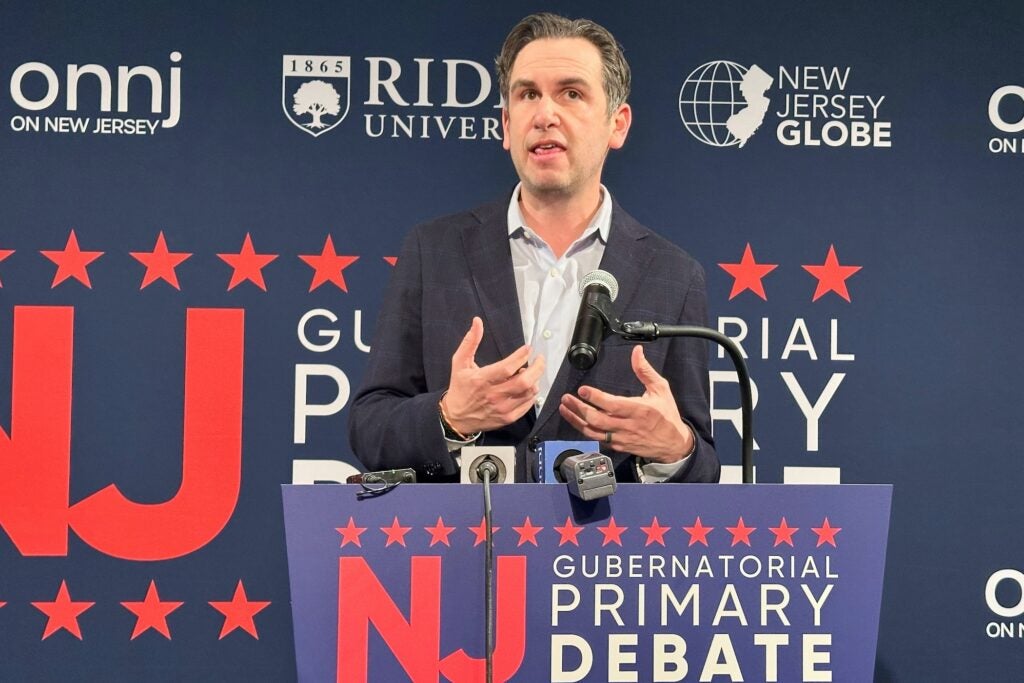
Steve Fulop
Steve Fulop grew up in Edison, New Jersey. The son of Romanian immigrants, Fulop worked at his father’s delicatessen in Newark during his high school years, and after graduation he went to Binghamton University.
He studied at Oxford University in the United Kingdom, then got a job at Goldman Sachs in New York City.
“After 9/11, I left to enlist in the Marine Corps, and was deployed out to Iraq,” he said. “I viewed it as a partial payment for citizenship.”
In 2006, Fulop completed his service to the Marine Corps Reserve with the rank of Corporal, and returned to Goldman Sachs.
In 2005, Fulop ran for the Jersey City Council and won.
“It got me interested in social service and public service,” he said.
He was elected mayor of Jersey City in 2013, after being a councilman for eight years.
“Understanding local government in a place like Jersey City, and having the accomplishments that I have, I think I’ll be well situated to do the same for the state,” he said.
The issues
Fulop’s campaign promises include fixing NJ Transit and expanding light rail and the bus system. He is in favor of statewide investment in smart transportation infrastructure..
“This will energize housing and employment,” Fulop said. “Construction of housing, in order to drive down costs, is a key issue, and I think we have the most comprehensive plan.”
He said building on New Jersey’s successes in K-12 traditional public schools is also a top priority, and he wants to focus on reshaping higher education and special needs, while amending the state school funding formula.
Fulop said he is committed to ensuring public safety and wants to establish a fair and strong criminal justice system.
He said he will address government reform.
“Most people would agree that faith in our state government has eroded over the last several years, a direct result of legislators and elected officials taking repeated steps to undermine the public trust,” Fulop said. “Good government works for the people, it leads to more efficiency and ensures that elected officials prioritize their constituents over their own interests.”
Fulop is married and has two young children.
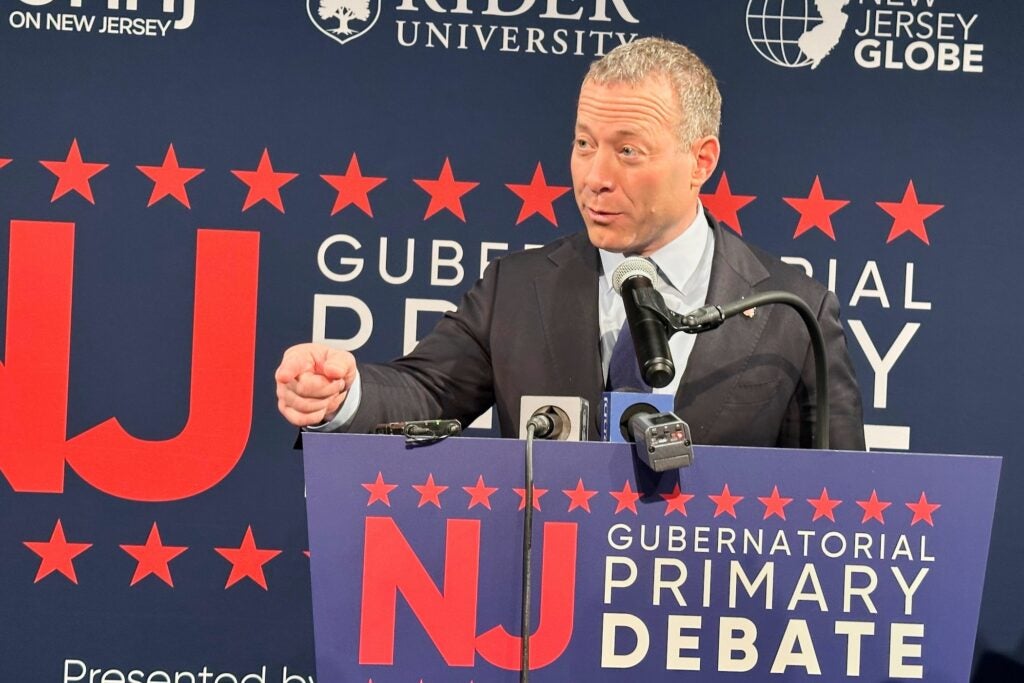
Josh Gottheimer
Josh Gottheimer grew up in North Caldwell in Essex County, New Jersey and attended West Essex High School. He also worked at his father’s small business. After graduation he studied history at the University of Pennsylvania, then attended Harvard University Law School.
Gottheimer interned for the former U.S. Sen. Frank Lautenberg and also worked for President Bill Clinton as a speech writer. He served at the U.S. Commission on Civil Rights during the Obama administration.
“After that I worked on some campaigns, and then eventually I worked at Ford Motor Company and Microsoft,” he said.
In 2016, he ran for Congress in the 5th District and won and has served in that capacity ever since.
The issues
Gottheimer said his number one campaign issue is lower taxes.
“I’m a huge believer that we’ve got to do anything we can to get costs down and taxes down for families in Jersey,” he said. “If you look at the numbers, we’re losing people instead of gaining people in the state and losing jobs because people just can’t afford to stay here.”
He said taxes, rents and all costs associated with housing along with utility bills and food are overwhelming families, young people and seniors.
“An AARP survey found 41% of seniors are considering leaving the state because it’s too expensive,” Gottheimer said. “My campaign is focused on lower taxes, lower costs, fighting for Jersey families, including fighting Donald Trump if he messes with us.”
He said another front-burner issue is fighting hate.
“As governor, I won’t tolerate hate, bigotry, or discrimination against anyone in New Jersey,” he said. “I’ll work hard to enforce our hate crime laws, close the racial wealth gap, and tackle disparities in education, housing and the workforce.”
He said he is also focused on lowering the cost of child care.
“I go to diners a lot, I sit down in a booth with people and literally it’s like having the same conversation wherever I go in the state,” he said. “[People say] I love Jersey, it’s a great place to raise a family, great schools, great people, but it’s just too damn expensive, can you help? It’s why I put out a tax cut plan when I announced I was running for governor.”
Gottheimer is married and has two young children.
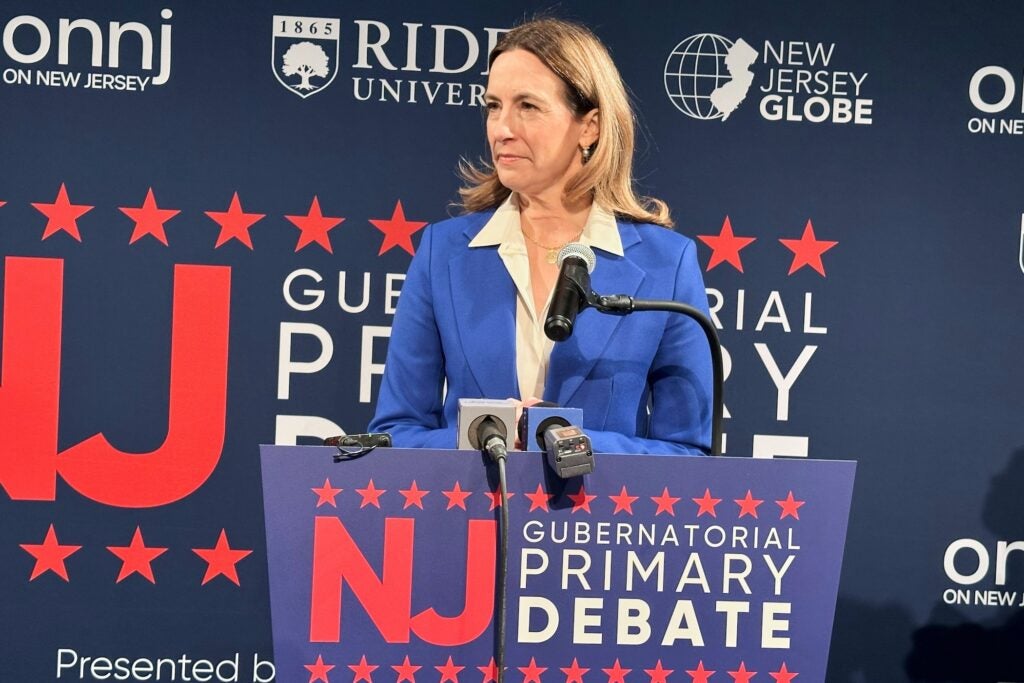
Mikie Sherrill
Mikie Sherrill grew up in cities up and down the East Coast, including Charlotte, North Carolina, Maryland and Reston, Virginia, because her father’s job required frequent relocation. She attended high school in Reston. Her grandfather, a World War II veteran, inspired her to join the U.S. Naval Academy in Annapolis, Maryland.
“I wanted to fly, so I went to Pensacola, Florida and Corpus Christi, Texas, for [helicopter] flight training,” she said.
Sherrill spent almost 10 years on active duty in the U.S. Navy, and was deployed to the Middle East and Europe.
“At the time we were involved in the conflict with Kosovo, so we supported the fleet out in the Adriatic Sea,” she said.
She then worked on the Battle Watch Floor in the European Theater during the Iraq War and was a Russian policy officer aiding in the implementation of nuclear treaty obligations while overseeing the relationship between the U.S. Navy and Russian Federation Navy.
Sherrill graduated from Georgetown University Law School and joined the U.S. Attorney’s Office in New Jersey. As an outreach and reentry coordinator, she established programs to develop trust between law enforcement and different communities.
In her first-ever run for office in 2018, she was elected to Congress in New Jersey’s 11th District.
The issues
Affordability is a key issue in Sherrill’s campaign.
“It’s become really, really difficult for families in New Jersey to make it, to afford a house or rental prices,” she said. “We’ve also seen utility and health care costs and property taxes go up, part of the problem is we’re just not running government efficiently, we’re not forcing it to work for the people in New Jersey.”
Sherrill said she is committed to building more affordable housing and would launch first-time homebuyer programs that can support residents with good credit ratings and stable employment with down payments. She said cutting through construction red tape and permitting problems will be a top priority in her administration. She said she also wants to counter the current divisive narrative propagated by the Trump administration.
“I’m really appalled by the attacks on rights and freedoms I see coming from Washington,” Sherrill said. “I’ve served [in the military] in places where people are picked up and detained without charges and sometimes never seen again. I never thought I would see this kind of police state going on in the United States of America.”
She said as governor she will fight for the rights of New Jersey residents.
“They’re cutting so many of the programs that lead to success, and so as governor I’m going to push and make sure here in New Jersey we’re going to make sure that we’re taking a different path forward,” Sherrill said.
Sherrill is married and has four children.
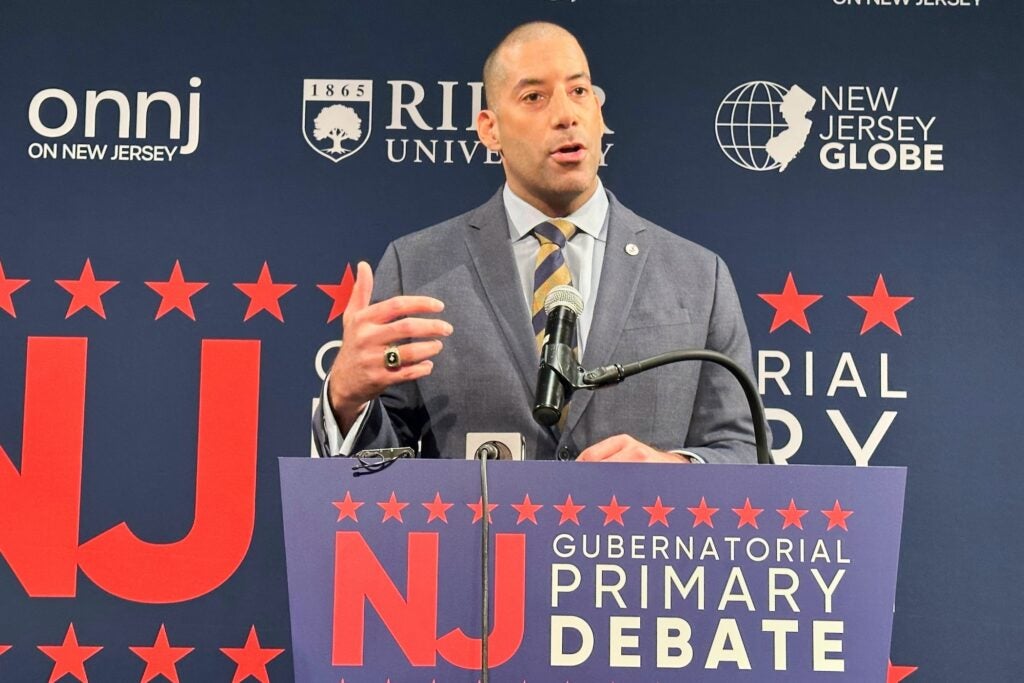
Sean Spiller
Sean Spiller came to the United States from Jamaica as a young boy. His family settled in Montville, New Jersey.
“I had a wonderful experience with some great schools and great opportunities, but right away I also saw the challenges,” he said. “We were one of two families of color in the whole town, so that comes with its understandings and certainly challenges.”
He was an avid ice hockey player. After high school, Spiller attended Rutgers University, studied science and psychology, and played hockey for the Scarlet Knights.
His first job after college was working for the Associated Press as an assistant sports editor. He decided to go back to school to study education and landed a job as a high school science teacher.
“My mom was a teacher in Jamaica, and I really enjoyed teaching too, it was a wonderful experience,” he said.
Spiller said he became interested in politics while he was a teacher.
“I remember sitting there and coming to the conclusion that I should have some say in what happens in this classroom,” he said. “I quickly realized all these decisions are made by people who are in elected office and if we’re not participating in that process these decisions are being made for us.”
He ran for town council in Montclair and won. He served for eight years then successfully ran for mayor in 2020. One year later, Spiller was elected president of the New Jersey Education Association.
The issues
He said the number one campaign issue in New Jersey is affordability.
“It’s about making sure we’ve got housing that’s affordable, that means both home ownership, and it’s about making sure we control rent costs,” he said. “I’m proud we passed the first rent control law in Montclair.”
He said quality early education and childcare are also front-burner issues for his campaign.
“The average cost [of childcare] is $19,000 a year, that’s unaffordable for folks,” he said. “I’d get more people in, doing that work, and change the way they’re compensated.”
Spiller said he is concerned about rising health care costs and said he is the only candidate who has designed health care plans that will save billions of dollars for the employers and the employees. Another important issue in his campaign is the cost of energy.
“We haven’t invested, we haven’t diversified off of big oil, they keep charging us more and by the way, we keep paying the price,” Spiller said. “It’s about investing in those places that keep life more affordable for New Jersey residents.”
Spiller has vowed to stand up to Trump and protect New Jersey residents.
Spiller is married with two young children.
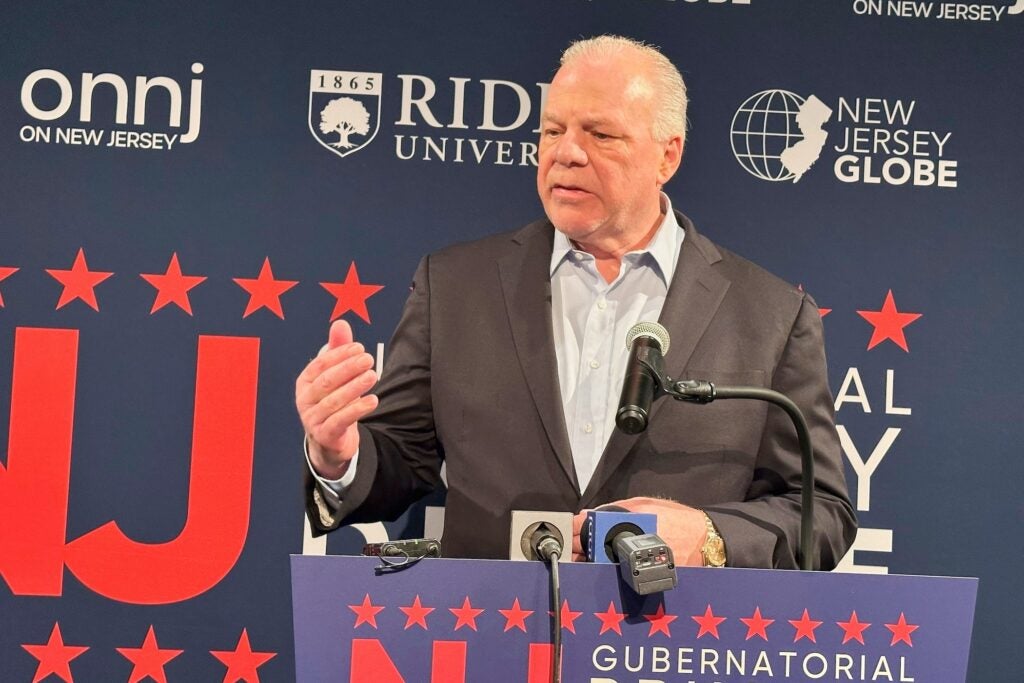
Steve Sweeney
Steve Sweeney grew up in Pennsauken, New Jersey, and attended Pennsauken High School. After school, he became a unionized ironworker.
Sweeney said he had “zero interest in politics” until his daughter was born with Down syndrome.
“She was born with a disability, she was premature, weighed two pounds, and I’ve got to be honest with you, I just got very angry with the way people treat people with disabilities,” he said. “I’d go into a restaurant with my daughter and people would stare at her. She’s beautiful.”
He said he understands people aren’t trying to be mean, but they don’t realize what impact their behavior can have.
“You can complain about things or you can do something about it so I decided to run for office,” he said.
Sweeney was elected to the Gloucester County Board of Chosen Freeholders and served from 1997 to 2010. He was elected to the state Senate in 2002 and became Senate president in 2009, serving in that capacity until he left the Senate in 2021. He is currently the first general vice president for Ironworkers International Union of North America.
The issues
“Most importantly Democrats have really gotten off message,” he said. “We need to focus on the economy because in 1992, it was ‘the economy, stupid,’ and 200 years from now it’ll be ‘the economy, stupid,’” Sweeney said. “People worry about having a job so they can take care of their family and pay their bills, so focusing on the economy and affordability is a top priority.”
He said he promoted more shared services in Gloucester County than anywhere in New Jersey.
“Our job is to deliver services, but we need to be efficient when we deliver them,” Sweeney said. “New Jersey, with 565 towns and 600 school districts, is the furthest thing from efficient. The people of New Jersey are really fed up, and they should be. We must do better.”
Sweeney said as governor he will find creative ways to reduce government.
“I know how to do it, in fact I’m the only one who’s running on either side [of the aisle] who’s done it, reducing government, and reducing government costs,” he said.
Sweeney, like his counterparts, believes that affordable housing and fixing NJ Transit remain vital issues in the Garden State.
“We just gave Transit a corporate business tax charge, we have to constitutionally dedicate that funding to NJ Transit, or it will be used in other ways,” Sweeney said. “You need somebody who is willing to roll up their sleeves, not worry about making people happy but getting the job done, to bring the cost of government down in New Jersey.”
Sweeney is married with two adult children.

Get daily updates from WHYY News!
WHYY is your source for fact-based, in-depth journalism and information. As a nonprofit organization, we rely on financial support from readers like you. Please give today.







